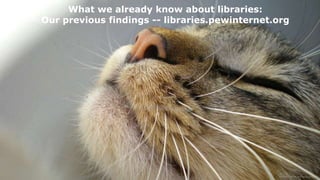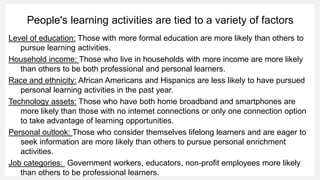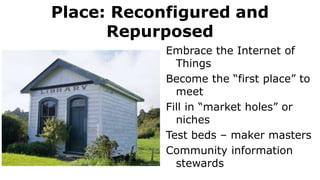How the public grades libraries – and uses libraries
- 1. How the public grades libraries – and uses libraries Lee Rainie Director, Pew Internet Project June 27, 2016 ALA - Orlando @lrainie | @pewinternet | @pewresearch
- 3. What we already know about libraries: Our previous findings -- libraries.pewinternet.org
- 4. • People think libraries are important, especially for communities • People like and trust librarians • People think libraries level of the playing field for those without vast resources • People believe libraries have rebranded themselves as tech hubs • People still read books
- 5. Latest book reading stats 79 74 72 7371 65 63 65 17 23 27 28 14 13 12 14 2011 2012 2015 2016 Total (any format) Read a print book Read an e-book Listen to audiobook %
- 6. The typical (median) American adult read 4 books in the past 12 months --- The average (mean) read 12 books Mean Median Total (All adults 18+) 12 4 Sex Male 9 3 Female 15 5 Race/ethnicity White 14 5 Black 9 3 Hispanic 6 1 Age group 18-29 12 5 30-49 12 4 50-64 11 3 65+ 13 3 Education level High school grad or less 8 2 Some college 12 4 College graduate 17 7 Household income Less than $30,000 per year 10 2 $30,000-$49,999 per year 12 4 $50,000-$74,999 per year 13 5 $75,000 or more per year 14 5 Community type Urban 11 4 Suburban 12 3 Rural 12 4
- 8. Went to library / bookmobile in past 12 months % of those ages 16+ 53 48 44 48 0 10 20 30 40 50 60 2012 2012 2013 2015 2016 Heavier users include parents of minors, women, those under 60, those with college degrees +
- 9. Used library website in past 12 months % of those ages 16+ 20132012 2015 25 30 31 27 0 10 20 30 40 50 60 2012 2013 2015 2016
- 11. If your local public library CLOSED, would that have a MAJOR impact, MINOR impact or NO IMPACT on … 33 66 33 25 33 6 0 20 40 60 80 100 Me & my family My community Major Impact Minor impact No impact
- 12. Do you think your local public library provides you with the resources you need, or not? 77 11 12 0 20 40 60 80 100 Yes No Don’t know Especially true for those under age 50 and doubly true for Millennials
- 13. How much, if at all, do you think your local public library contributes to the following things in your community? 29 38 47 49 58 69 36 35 32 31 29 20 16 14 9 10 5 3 8 6 4 3 3 3 10 7 8 7 5 4 0 20 40 60 80 100 Serving as a gathering place for addressing challenges in your local community Promoting a sense of community among different groups within your local area Providing a trusted place for people to learn about new technologies Helping spark creativity among young people Creating educational opportunity for people of all ages Providing a safe place for people to spend time A lot Some Not too much Nothing at all Don't know
- 14. How much have libraries contributed to their communities? % of those ages 16+ 19 22 24 29 31 36 37 37 34 39 39 39 37 37 17 21 19 19 14 14 15 17 14 10 8 8 6 7 0 20 40 60 80 100 Helping people when a natural disaster or major problem strikes the community Helping people find jobs or pursue job training Helping people find out about volunteer opportunities and other ways people can make contributions to your community Helping people learn about local events and resources that are available in your community Helping people learn how to use new technologies Helping people when they seek health information Helping people decide what information they can trust A lot Somewhat A little Not at all
- 15. June 27, 2016 15www.pewresearch.org The clear public mandate: Do something for education …. Large majorities of Americans see libraries as part of the educational ecosystem and as resources for promoting digital and information literacy.
- 16. 24 30 20 40 40 39 31 25 36 Apr-16 Apr-15 Nov-12 Should definitely not do Should maybe do Should definitely do Should libraries move some print books and stacks OUT OF public locations to free up more space for things such as tech centers, reading rooms, meetings rooms, and cultural events? % of those ages 16+
- 17. Should libraries coordinate more closely with local schools in providing resources to kids? % of those ages 16+ 85 11 2 0 10 20 30 40 50 60 70 80 90 100 Should definitely do Should maybe do Should definitely not do
- 18. 85 12 2 0 10 20 30 40 50 60 70 80 90 100 Should definitely do Should maybe do Should definitely not do Should libraries offer free early literacy programs to help young children prepare for school? % of those ages 16+
- 19. Should libraries offer programs to teach people, including kids and senior citizens, how to use digital tools such as computers, smartphones and apps? % of those ages 16+ 80 16 4 0 10 20 30 40 50 60 70 80 90 100 Should definitely do Should maybe do Should definitely not do
- 20. This really registers now because people think education matters more and they want to be more attuned to learning
- 21. Learning as identity (% of those ages 18+) 57 61 73 0 10 20 30 40 50 60 70 80 I often find myself looking for new opportunities to grow as a person I like to gather as much information as I can when I come across something that I am not familiar… I think of myself as a lifelong learner Describes me very well
- 22. 74% of all adults are personal enrichment learners % of those ages 18+ 16 25 30 35 58 0 10 20 30 40 50 60 70 Taken online course Taken course related to interest/hobby Attend convention/conference tied to personal interest Attended meeting where learned new info such as book club or arts… Read publications related to personal interest
- 23. The motives of personal learners % of those ages 18+ 33 36 60 64 80 0 10 20 30 40 50 60 70 80 90 Learn something to help with my children's or other kids school work Wanted to turn a hobby into extra income Extra time on my hands Learn something that would allow me to help others Learn something make my life more interesting
- 24. 63% of the employed (36% of all adults) are work-related learners – i.e. gotten training or taken courses (% of those ages 18+) 7 13 24 36 55 0 10 20 30 40 50 60 Because I am worried about losing job To help get a new job To help get a raise/promotion For a license or certification for my job To maintain or improve my job skills
- 25. People's learning activities are tied to a variety of factors Level of education: Those with more formal education are more likely than others to pursue learning activities. Household income: Those who live in households with more income are more likely than others to be both professional and personal learners. Race and ethnicity: African Americans and Hispanics are less likely to have pursued personal learning activities in the past year. Technology assets: Those who have both home broadband and smartphones are more likely than those with no internet connections or only one connection option to take advantage of learning opportunities. Personal outlook: Those who consider themselves lifelong learners and are eager to seek information are more likely than others to pursue personal enrichment activities. Job categories: Government workers, educators, non-profit employees more likely than others to be professional learners.
- 26. June 27, 2016 26www.pewresearch.org How are libraries performing in this new environment?
- 27. How well, if at all, do your local public libraries serve the learning and educational needs of your local community – not just children at schools, but all those of any age who want to learn? % of those ages 18+ 37 39 6 4 12 0 20 40 60 80 100 Very well Pretty well Not too well Not well at all Don't know
- 28. How well, if at all, do your local public libraries serve the learning and educational needs of you and your family? (% of those ages 18+) 34 36 9 12 8 0 20 40 60 80 100 Very well Pretty well Not too well Not well at all Don't know
- 29. As far as you know, does your local library system offer any of the following services? (% of those ages 18+) 22 24 26 41 62 0 10 20 30 40 50 60 70 Online programs that certify people have mastered new skills Programs on starting a new business Online GED or high school equivalency classes Online career- and job-related resources E-books, audio books for borrowing
- 30. Other yearnings …. Privacy coaching and solitude
- 31. Should libraries offer programs to teach patrons about protecting their privacy and security online? % of those ages 16+ 76 18 4 0 10 20 30 40 50 60 70 80 90 100 Should definitely do Should maybe do Should definitely not do
- 32. Should libraries have more comfortable spaces for reading, working, and relaxing at the library? % of those ages 16+ 57 30 9 0 10 20 30 40 50 60 70 80 90 100 Should definitely do Should maybe do Should definitely not do
- 33. People: Serve and Learn Tech AND data experts Master teachers in age of lifelong learning Visionaries for the knowledge economy and the jobs it produces Monitors of algorithms
- 34. Place: Reconfigured and Repurposed Embrace the Internet of Things Become the “first place” to meet Fill in “market holes” or niches Test beds – maker masters Community information stewards
- 35. Platform: Community Resource Trusted, top-of-mind institution for learning Advocates for free and open Advocates for closing digital divides Privacy watchdog Civic specialists – esp. in learning realms
- 36. Fear not
Editor's Notes
- https://www.eventscribe.com/2016/ala-annual/fsPopup.asp?Mode=presInfo&PresentationID=158274 Title: How the public grades libraries – and uses libraries Subject: Lee Rainie, director of Internet, Science and Technology Research at the Pew Research Center will cover the latest findings of the center’s public opinion polling about Americans use of libraries and their feelings about the role that libraries play in their lives and in their communities. The new findings will cover the latest library-usage trends, book-reading trends, and insights into the ways more and more Americans hope libraries will offer community-oriented and educational services.




































